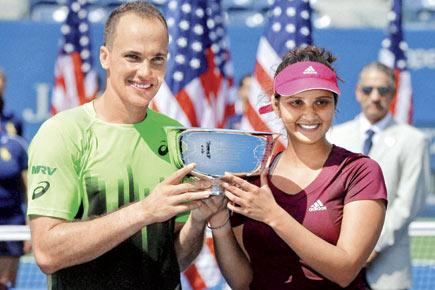How low we can sink is made clear from two disconnected events and reactions to them on social media: The first, the current devastating floods in Jammu and Kashmir and the second, tennis player Sania Mirza’s Mixed Doubles title at the US Open during the weekend

 How low we can sink is made clear from two disconnected events and reactions to them on social media: The first, the current devastating floods in Jammu and Kashmir and the second, tennis player Sania Mirza’s Mixed Doubles title at the US Open during the weekend.
How low we can sink is made clear from two disconnected events and reactions to them on social media: The first, the current devastating floods in Jammu and Kashmir and the second, tennis player Sania Mirza’s Mixed Doubles title at the US Open during the weekend.
ADVERTISEMENT
It is hard to imagine the kind of mindset which connects death by natural calamity to the religion of the victims or their political affiliations. And yet, that is what being religious sometimes does to people. Whether the religion calls itself tolerant or compassionate or the religion of peace, it makes itself a cause of strife rather than solace by insisting on its own superiority. And becomes the very thing it claims it is not.

A popular right-wing tweeter questioned the “big deal” being made of Sania Mirza’s Mixed Doubles US Open victory, suggesting that only failed singles players take to doubles. Earlier, a BJP politician had questioned Mirza’s loyalty to India, just after she was made brand ambassador of the new state of Telangana, since she is now married to a Pakistani cricketer. Pic/PTI
Victims of the floods, therefore, are seen through the prism of Hindu or Muslim, and sympathy or empathy for their condition is calibrated accordingly. So, people, particularly on social media and in drawing rooms, have expressed happiness that Kashmiri Muslims are inundated by floodwater or questioning whether Hindus in Kashmir will even be saved. There is a strong reaction to the Indian Armed Forces helping in flood rescue, with calls for rescuers to prove their loyalty to India or stop their campaign against excesses by the army in J&K. BJP MPs and admirers both have commented that Kashmiris who criticise the Indian Armed Forces should now be grateful for their help. Yet, one would imagine that the Indian Armed Forces are professional and honourable enough to work during a national emergency regardless of criticism received in the past. If not, then we are on a very slippery slope.
Nothing, therefore, is too big for petty politicking, and there is no scope for a sort of universal compassion. Even if your preferred religion either preaches that or you yourself claim that it teaches that.
And then there are the reactions to Sania Mirza. A popular right-wing tweeter questioned the “big deal” being made of Mirza’s victory, suggesting that only failed singles players take to doubles. If this person was a sports enthusiast or an expert or commented regularly on tennis, the point could be debated. But, it seemed odd to pick on Mirza just after a BJP politician questioned Mirza’s loyalty to India when she was made brand ambassador of the new state of Telangana. This tweet got a flood of support and several vicious comments about Mirza not about her tennis, mind you, but her religion and the nationality of her husband.
In case you had missed it, Mirza is a Muslim and she is married to a Pakistani cricketer. But, as she has pointed out innumerable times whether she has to or not her loyalty remains to India and she continues to represent India at international tennis and other sporting events. The underlying suspicion is clear: Mirza is a Muslim and can, therefore, be questioned at any time. Is it odd that no one accused Mahesh Bhupathi for instance — of being half a tennis player or questioned whether India should celebrate his several triumphs at Grand Slam events? Even Leander Paes, who is not always the most popular of players amongst the Indian tennis fraternity, has had either his patriotism or his talent similarly questioned.
Without putting too fine a point on it, the underlying majoritarian bigotry of Indian society has found its voice, and feels that it no longer has to live underground. The BJP is in power at the Centre.
Narendra Modi, the Hindutva hero for many, is the prime minister. “Us and them” is central to several discourses and the general presumption is that “they” have had their chances and now it is “our” turn to control discussions. This attitude speaks to a great insecurity because this “they” does not exist as an identity. It is disparate and diverse but may not, always, be inimically opposed to those who are not Hindus.
Meanwhile, hundreds have died and the lives of thousands have been destroyed in Jammu & Kashmir. And Sania Mirza has done India proud.
Religion, in fact, has nothing to do with it. Nor should petty bigotry.
Ranjona Banerji is a senior journalist. You can follow her on twitter @ranjona
 Subscribe today by clicking the link and stay updated with the latest news!" Click here!
Subscribe today by clicking the link and stay updated with the latest news!" Click here!







